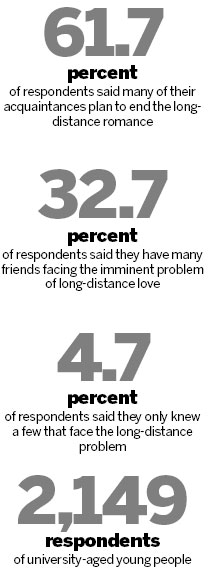Focus
Romance under pressure
By Du Juan (China Daily)
Updated: 2010-07-09 09:33
 |
Large Medium Small |

Long-distance relationships are becoming more common in China today, as transportation and communication becomes easier and faster. According to a recent survey carried out by China Youth Daily, 61.7 percent of 2,149 university-aged respondents said many of their friends or classmates in long-distance relationships planned to end them when they graduate, 32.7 percent said they had at least some friends in this situation and only 4.7 percent said they only knew a few people like that.
A "long-distance relationship investigation" by a newspaper in Nanjing reported that half the couples in such relationships are under the age of 30, and that most were in college or at the beginning stages of their career.
The main reasons the couples were separated were overseas education (35 percent of respondents) and different job locations (43 percent of respondents).
On www.yidilian.com, an online forum dedicated to long-distance relationships, nearly 50 percent of the forum members said they are in such relationships because their boyfriends or girlfriends are studying in another country.
Yan Hua, a Beijing woman who married an American man last year, had a long-distance relationship with her future husband for three years before they married.

They met each other at a mutual friend's wedding. Since the man worked in the US and Yan worked in Beijing, they mainly communicate through MSN and phone calls.
"We had a solid rule that we would talk on MSN each day at noon, no matter what," said Yan.
She said their relationship persevered because both she and her future husband believed it had a future. During their three-year courtship, Yan's future husband came to China just four times, including their initial meeting at the wedding.
"Having the same goals is important. I started to apply to American universities after we dated each other online for a while. So we know we were going to be together at some point," said Yan.
In 2008, Yan successfully applied to a US college and went there in the summer. They spent one year together in the US and then decided to marry last year. Yan graduated, found work at a small company near their home and they are now starting a family.
Duan Feng, a graduate of Beijing Jiaotong University has had a boyfriend for three years, but this September her boyfriend will leave for Canada to study. She will remain in school here in China studying for her master's degree.

"I feel nervous that I am going be apart from him. We stayed together for most of the past three years. He has become part of my life," said Duan. "But I believe that we will have a future. He promised me that he will come back after graduation. Two years is not a long time but it is not short either."
In an online survey on a dating website, www.jiayuan.com, which asked respondents if they had confidence in their long-distance relationships, 48.65 percent of male respondents said they did, while fewer than 20 percent of female respondents said so.
Some respondents said being separated by long distances was a good test of the relationship's seriousness, given the expenses involved in transportation and communications.
"Long-distance love is full of risks even today, no matter how developed transportation and telecommunication devices have become. Those who suffer a long-distance relationship do it either out of idealization or paying less attention to the real conditions," said Jiang Qianjing, well-known psychologist with Zhejiang University.
"A couple that cannot live together in the same city will know less of their partner's character, life styles, attitudes from their parents, as a result of the distance, which might turn out to be a potential hazard for the relationships," he added.
Jiang said a process from long-distance romance to marriage was necessary to sustain the relationship.
"It is the attitudes and feeling of person-to-person contact that makes a difference."